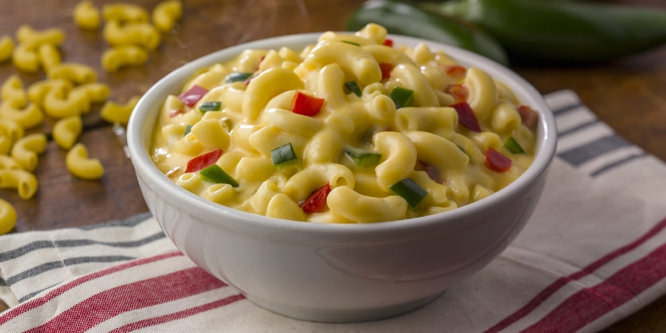
Photo: Luby’s
H-E-B’s go local approach produces results
Luby’s, the Texas-based cafeteria chain, will bring its famed Mac & Cheese to retail for the first time. But the dish will only reach the frozen food aisles of another Texas institution, H-E-B. Luby’s Mac & Cheese, virtually unchanged since being introduced in the 1940s, along with a signature jalapeno version, landed in 270 of H-E-B’s 380 locations on Dec. 5.
“We’re incredibly excited to embark on our first retail engagement with a brand that shares such a similar background and connection to the communities where it operates,” said Peter Tropoli, COO of Luby’s, Inc., in a statement. “The opportunity to bring our home cooking into so many homes is a truly wonderful way to enter our eighth decade of business.”
In early 2017, another Luby’s signature item, “Fried Fish,” will reach H-E-B’s freezers. The block of cod is known to locals as “Square Fish.”
“We’re thrilled that two Texas traditions are joining together,” added Scott McClelland, president of H-E-B’s Houston division.
Partnering with local restaurants and food trucks is part of a larger movement by grocers to partner with local food suppliers. A recent article in the Orlando Sentinel notes how barbecue sauces, salsas and pasta sauces have seen the biggest restaurant-to-grocery store push within this trend because of their long-shelf life, but such partnerships can cover a wide range of categories.
The Orlando food truck, Sweet City Gelato, for instance, earlier this year entered into a partnership to bring gelato pints to select Lucky’s Markets in Florida as part of the chain’s Lucky’s Loves Local initiative.
“Having the gelato in the food truck and in stores play off of each other,” Sweet City owner Monika Tyler told the Orlando Sentinel. “Our truck is mobile advertising, and when we don’t have it running, our fans can find it at the store.”
- Luby’s Celebrates 70 With H-E-B; Landmark Cafeteria Chain To Roll Out Famed Mac & Cheese Into The Frozen Food Aisles Of More Than 270 H-E-B Stores Around Texas – Luby’s/H-E-B/PR Newswire
- Restaurants, food trucks testing flavors on supermarket shelves – Orlando Sentinel
- Sweet City Gelato In Stores – Sweet City Gelato
- Orlando Food Truck Gets Gelato into Lucky’s Market – The Daily City
- Lucky’s Loves Local – Lucky’s Market
Discussion Questions
DISCUSSION QUESTIONS: Do you see grocers partnering with local restaurants or food trucks as a solid strategy for achieving growth? How does the opportunity compare with partnering with local food manufacturers?


This makes perfect sense. Since all retail is in fact local, partnering with local merchants and suppliers is a good way for a retailer to develop a meaningful differential advantage. Plus, the emergence of meal kits and prepared deli foods make the availability of local restaurant and food truck options a complimentary fit to offering what’s for dinner tonight.
It is a good start on the new local sourcing trend we are seeing in grocery. It is done mostly in produce, but now teaming up with local restaurants will appeal to many customers. I do question the taste and quality of the product as so many microwaves and ovens are different. I would also question if the restaurant going into manufacturing is a new opportunity for growth or failure. It’s been done before with P.F. Chang’s, and very successfully, but there were more items, too.
Woodard of Coca-Cola a century ago used the mantra, “Always within arm’s reach of desire,” to drive Coke distribution. Mars used a similar approach. There is a certain satisfying ring to this aggressive PUSH sales thinking, rather than the nearly universal (today) “come and get it” passivity. You want more sales? Get your product/service in front of more people. The crucial first step, REACH, need not be passively waiting on a shelf for somebody to do something. “Nothing happens until someone sells something!”
Local is one of the supermarket industry’s current buzzwords, as in locally-sourced, etc. Bringing in successful local brands, supermarkets create a number of positive consumer perceptions. This is true whether the retailer is a manufacturer, food truck or restaurant. However, I don’t see meaningful sales growth from adding a few SKUs.
I think it works in this case because there is a strong local restaurant chain and a strong local retailer; and by “strong” I mean not just their financial performance but market share and ability to innovate (though of course the three are all integrally related).
We see limited examples of this in the Bay Area — local wurst or hot sauces and such — and I imagine other large areas do as well, but here there’s a shortage of “signature dishes” which could readily be sold in stores … no one’s going to pay $150 for a frozen version of Chez Panisse’s table d’hote menu (even if it was possible).
Rosser Reeves, the Advertising giant from the Ted Bates Agency pointed out the vital importance of establishing a “Unique Selling Proposition,” or USP. H-E-B and Luby’s, two powerful regional brands have identified a USP that has lasting power.
These two pros recognize that they have a common share of stomach appreciation among consumers in the Southwestern U.S. and Texas, as a base. Each firm will gather a win as they view their customer through a similar lens. In taking advantage of the USP, each chain secures added loyalty from fans who end up saying, “You really get me.” That serves to build loyalty and retention.
Numerous other local fare pop up on the radar all across the country. Just one that comes to mind, Skyline Chili, is a local/regional favorite in Cincinnati and Ohio. Kroger and Skyline work hand-in-hand to their customers’ advantage in bringing the product home. Solid innovative thinking on the part of grocers and other retailers as they build their ticket, and hold people in-store.